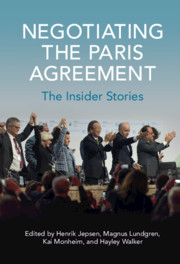Book contents
- Negotiating the Paris Agreement
- Negotiating the Paris Agreement
- Copyright page
- Contents
- Figure
- Editors
- Contributors
- Acknowledgments
- Foreword
- 1 Introduction
- 2 The Paris Negotiations: Background and Context
- 3 The French COP 21 Presidency
- 4 Mission: Adoption with Ovations: The Contribution of the UNFCCC Secretariat to the Achievement of the Paris Agreement
- 5 The Paris Agreement and China’s Imprint
- 6 The EU’s Role in the Paris Agreement
- 7 The United States: Interesting Processes and Techniques Lined the Road to Paris
- 8 COP 21 – Complaints and Negotiation: The Role of the Like-Minded Developing Countries Group (LMDC) and the Paris Agreement
- 9 The Staircase of Paris
- 10 The Battle for Small Island Developing States
- 11 The High Ambition Coalition
- 12 The Power of Civil Society
- 13 Business: Creating the Context
- 14 Why Did They Finally Reach Agreement?
- 15 Conclusion: The Landscape of Multilateral Agreement in Paris and Beyond
- Afterword
- Appendix: The Paris Agreement
- References
- Index
9 - The Staircase of Paris
Published online by Cambridge University Press: 24 September 2021
- Negotiating the Paris Agreement
- Negotiating the Paris Agreement
- Copyright page
- Contents
- Figure
- Editors
- Contributors
- Acknowledgments
- Foreword
- 1 Introduction
- 2 The Paris Negotiations: Background and Context
- 3 The French COP 21 Presidency
- 4 Mission: Adoption with Ovations: The Contribution of the UNFCCC Secretariat to the Achievement of the Paris Agreement
- 5 The Paris Agreement and China’s Imprint
- 6 The EU’s Role in the Paris Agreement
- 7 The United States: Interesting Processes and Techniques Lined the Road to Paris
- 8 COP 21 – Complaints and Negotiation: The Role of the Like-Minded Developing Countries Group (LMDC) and the Paris Agreement
- 9 The Staircase of Paris
- 10 The Battle for Small Island Developing States
- 11 The High Ambition Coalition
- 12 The Power of Civil Society
- 13 Business: Creating the Context
- 14 Why Did They Finally Reach Agreement?
- 15 Conclusion: The Landscape of Multilateral Agreement in Paris and Beyond
- Afterword
- Appendix: The Paris Agreement
- References
- Index
Summary
The perspective of the African Group of Negotiators (AGN) and the Least Developed Countries (LDCs) is provided by Tosi Mpanu Mpanu. United around key demands including enshrining the principle of Common But Differentiated Responsibility in the Agreement, recognizing the impacts of climate change already being experienced by developing countries and the need to adapt as well as to respond to the losses and damages inflicted, these highly vulnerable groups were able to sign on to a deal in Paris with confidence thanks to a number of carefully crafted political moments that took place in the run-up to COP 21, including the funding of the first projects of the Green Climate Fund and the launch of a number of African initiatives. Mpanu Mpanu draws on his considerable chairing experience, to share some tricks of the trade for brokering consensus. He compares the “staircase of Paris“, which all countries climb at their own pace, to the elevator of the Kyoto Protocol, which only carried a limited number of passengers. Agreement in Paris was contingent on a more consultative French Presidency learning process lessons from Copenhagen, and on the right global political momentum.
Keywords
- Type
- Chapter
- Information
- Negotiating the Paris AgreementThe Insider Stories, pp. 182 - 196Publisher: Cambridge University PressPrint publication year: 2021



